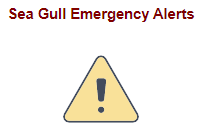Emergency Alert System (EAS)
The safety of the ÐÇ¿Õ´«Ã½ community during an emergency is predicated on planning as well as awareness of how plans will be implemented. Students, faculty, staff, and visitors will be better prepared in an emergency if they know how the University will respond, where to find information, and what to do. This site is an important tool in sharing plans and providing relevant information in case an emergency arises at ÐÇ¿Õ´«Ã½ or in the surrounding area.
Emergency SMS/Text Message Alerts
ÐÇ¿Õ´«Ã½ has implemented a new system that will allow faculty, staff and students to receive emergency alert text messages. This includes information on campus closures or delays, hazardous weather and other potential situations.
The Emergency Alert System (EAS) at ÐÇ¿Õ´«Ã½ was developed to provide emergency personnel with a means to rapidly communicate critical lifesaving information to the campus community. The EAS utilizes various communication technologies to increase the likelihood that a majority of the campus community will be alerted since no single solution can reach all individuals.
If ÐÇ¿Õ´«Ã½ confirms that there is an emergency or dangerous situation that poses an immediate threat to the health or safety of some or all members of the ÐÇ¿Õ´«Ã½ community, University Police will determine the content of the message and will use some or all of the EAS to communicate the threat to the campus community or to the appropriate segment of the community, if the threat is limited to a particular building or segment of the population. University Police will, without delay and taking into account the safety of the community, determine the content of the notification and initiate the notification system, unless issuing a notification will, in the judgment of the first responders, compromise the efforts to assist a victim or to contain, respond to, or otherwise mitigate the emergency.
The EAS uses a two-wave approach to alert and inform. The first wave consists of pre-recorded messages to address a variety of emergency conditions. The messages describe the nature of the emergency and what the campus population is asked to do. The second wave of information will follow that will provide updates to the emergency, as needed.
First Alert Wave using pre-recorded messages through:
- Siren alert with voice capability to facilitate outdoor communication across the campus
- Emergency SMS/Text Message Alerts
- Campus cable television emergency alert system
- Campus desktop computer emergency alert system
Second Alert Wave (could include some or all of the following methods):
- ÐÇ¿Õ´«Ã½ homepage
- Emergency web page
- Emergency SMS/Text Message Alerts
- ÐÇ¿Õ´«Ã½ Facebook page
- Twitter page
- Signs posted at building entrances
The pre-recorded messages of the First Alert Wave have been developed to address a variety of emergency conditions. It is important that individuals understand the nature of the warnings for the alert system and what to do if a pre-recorded alert is sounded. Here are some examples:

